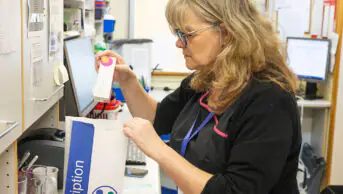
Callum Brown, JL / Shutterstock.com
Six months ago, I made the move from working as a pharmacist in an NHS pharmacy specials production unit to working in the quality improvement (QI) department of Northumbria Healthcare NHS Foundation Trust. Initially, the thought of QI struck me as dull, but I found myself frequently questioning how I could stop errors occurring in the first place and started to develop a keen interest. I realised that, as pharmacists, we are trained to spot errors and prevent subsequent harm to patients, but we may not give enough thought to the root causes of issues and how to resolve these.
I now spend my working day supporting QI projects within the trust and train other staff on the methodology behind them, such as lean management — which looks at continuous business improvement. Every project is different, and I am required to be adaptable in my approach. In some instances I lead the projects, whereas other projects require a lighter touch. It depends on the experience of the staff involved — the QI team has to be flexible.
My team comprises people from different backgrounds including administration, management and IT. Together, we have a well-rounded skillset that allows us to work well together.
08:00 — start
Occasionally I have a scheduled meeting or training to deliver, but today I kick off the day by reviewing my portfolio of projects. I have autonomy over planning my workload which, after being a specials pharmacist, took a bit of getting used to.
The trust I work for is spread over a large geographical area — North Tyneside and Northumberland — today I need to travel to North Tyneside General Hospital, which is only a ten-minute drive but travelling times can be up to an hour and a half to reach Berwick and anywhere in between. After reviewing my workload, answering emails and making a plan for the day, it’s time to hit the road.
Although a lot of travel is involved, it does allow me to work with really diverse teams and various individuals to help identify, analyse and resolve issues that may be causing reduced performance, such as inefficient processes and excessive waste.
Frontline staff are always the best placed to improve a system or process; not least as they are the ones who use it
10:00
I attend a meeting to evaluate how a particular project is progressing. The project involves streamlining the referral, triage and appointments processes for a geriatric outpatient service. Because many of the current systems in place are well established, a significant part of my role during these meetings involves speaking to people and understanding the barriers to change then breaking them down, which I enjoy. The most common barriers I encounter are fear of change or being too comfortable with the status quo. Frontline staff are always the best placed to improve a system or process; not least as they are the ones who use it. Encouraging frontline staff can be difficult because QI is often perceived as something for people at ‘higher’ levels — again this couldn’t be further from the truth. By raising this in our training and providing channels for staff to be able to speak up about ways to improve the current system and processes, their resistance to change usually dissipates.
I then make my way to attend another weekly progress meeting. Here, I am leading and managing the implementation of a patient acuity tool to assist nurse staff rostering. This will allow staff to be deployed to the areas where patient care requirements are highest.
After the meeting, I chase up on some outstanding work and ensure other teams have completed their assigned tasks.
13:00
After lunch, I spend time writing up a project report. This is important as they are used to summarise projects and collate learning into one easy to access document. This particular report was for the sexual health service, summarising bottlenecks that staff had identified and ideas for improvement, as well as next steps to help improve efficiency and patient flow.
When this is finished, I spend half an hour quickly catching up on news happening across the NHS and within the QI sector. My main sources of information are national news sources, as well as NHS Improvement bulletins and the government website. At the moment, I am particularly interested in how Brexit may impact the NHS as well as the upcoming flu season. I regularly attend training days and talks in order to maintain functional knowledge of the NHS and QI methodology.
15:00
I deliver a training session to clinical staff. This aims to encourage and provide guidance on how individuals can implement change across our organisation. It goes through our trust’s quality improvement formula and the skills required for leading QI projects. The training is very interactive to facilitate learning. The most common reason for people not getting involved is the misconception that they thought they could not, or were not, allowed to make changes. This couldn’t be further from the truth.
16:00 — finish
Before going home I check my emails and discuss project updates with my team ensuring I am prepared for the next day’s meetings.
Box: information for pharmacists interested in a similar role
- It is not necessary to be a pharmacist or clinician. However, the skills acquired as a pharmacist contribute to success in this role. For example, an eye for detail is required to observe processes and identify weaknesses, analytical skills are necessary to look at data objectively, and management and communication skills ensure individuals are able to work well with teams and progress projects;
- Anyone can improve their workplace. If you enjoy it and are considering it as a career then get involved in as many quality improvement projects or audits as possible to get the experience;
- Try and do some courses on lean management and team leading, as these skills are valuable for the role;
- Quality improvement roles are advertised on NHS jobs so look out for them on the website; entry level roles start at the band 6 level under the agenda for change;
- Find out if your employer has a QI department and ask how you can be involved.


